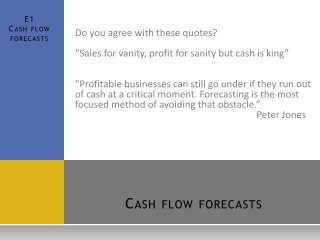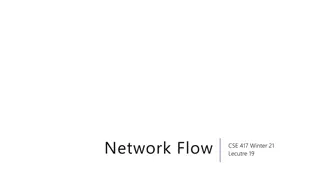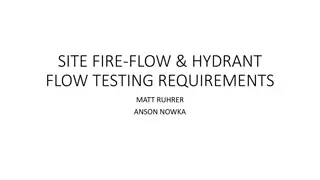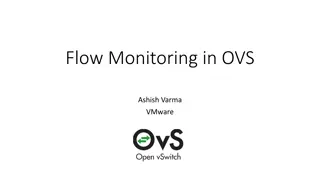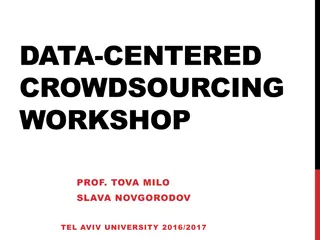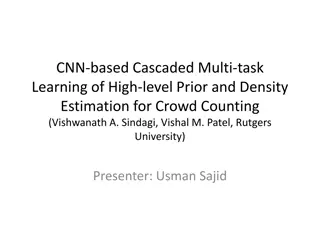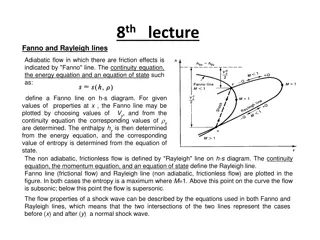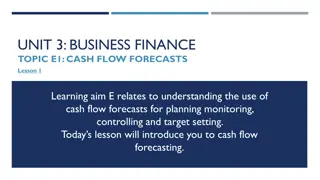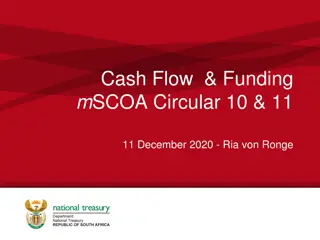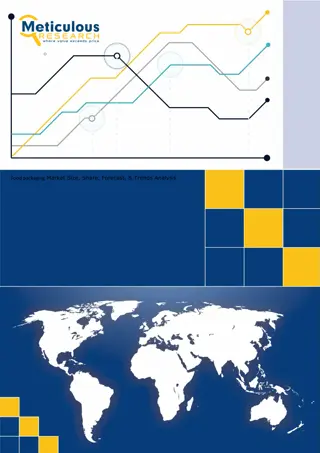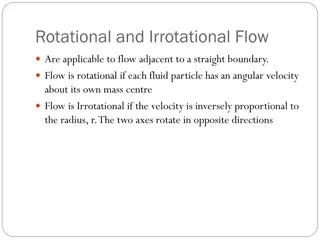Cash Flow Forecasts
Learn about cash flow fundamentals, inflows/receipts, outflows/payments, planning, monitoring, and cash flow statements. Discover the importance and benefits of cash flow forecasts in business management.
0 views • 29 slides
The Psychology of Flow: Achieving Total Focus and Optimal Performance
Engage in activities for their intrinsic value, where the ego diminishes, and time seems to vanish - that's when flow occurs. This optimal psychological state involves deep concentration, clear goals, and a sense of control. By embracing challenges and staying in the present moment, one can cultivat
0 views • 13 slides
Understanding Runoff in Hydrology
Runoff in hydrology refers to surface water flow from precipitation and other sources in drainage basins. It plays a crucial role in stream flow and peak flood formation, influenced by factors like overland flow, interflow, and groundwater flow. This article explores the sources of runoff, including
3 views • 27 slides
Understanding Max Flow in Network Theory
In network theory, understanding the concept of maximum flow is crucial. From finding paths to pushing flow along edges, every step contributes to maximizing the flow from a source to a target in the graph. The process involves determining capacities, creating flows, and calculating the net flow ent
2 views • 41 slides
Fire Flow Requirements and Calculation Methods
Detailed information on site fire flow and hydrant flow testing requirements, how to calculate required fire flow, applicable codes and standards including NFPA and IBC, duration of fire flow, methodologies for fire flow calculation, and ISO methods and formulas.
4 views • 30 slides
Flow Measurement Using V-Notch and Weirs in Engineering
Flow measurement in engineering involves the use of V-notch and weirs, such as rectangular weirs and triangular weirs, to calculate discharge rates and velocity of liquids. A V-notch is a triangular obstruction used for flow measurement, while weirs are larger scale structures for measuring river or
1 views • 7 slides
Developing an Android Application for Crowd Analysis and Abnormal Behavior Detection
Many urban areas face challenges with overcrowding, leading to potential risks in public places. This project aims to address these issues by developing an Android application that can analyze crowd behavior, track individuals, and detect abnormal events using data collected from users. By utilizing
0 views • 24 slides
Importance of Cash Flow Analysis in Financial Management
Cash flow analysis is a crucial financial tool for effective cash management, aiding in evaluating financial policies and positions. It helps in planning, coordinating financial operations, assessing cash needs, and meeting obligations. However, it has limitations as it does not substitute the incom
1 views • 7 slides
Understanding the Importance of Flow Charts in System Processes
Flow charts are valuable tools that visually represent the flow of data and process steps within a system. They help define problems, sequence steps to solve them, and show alternatives if issues arise. By using standard symbols, flow charts facilitate communication between engineers and clients, ai
1 views • 35 slides
Understanding Fluid Flows in Fluid Mechanics
Fluid Mechanics is the study of fluids in motion or at rest, and their interactions with solids or other fluids. Fluid flows are classified based on various characteristics such as viscous versus inviscid regions, internal versus external flow, compressible versus incompressible flow, laminar versus
1 views • 16 slides
Understanding Flow Monitoring in OVS for Efficient Network Management
Learn how Flow Monitoring in Open vSwitch (OVS) allows controllers to track and manage changes to flow tables, enabling efficient network management. Explore topics such as Flow Mod programming, Flow Monitor messages, OVS support, monitoring vs. snoop, and practical examples of flow monitoring in ac
0 views • 9 slides
Understanding Flow Chemistry for Efficient Chemical Reactions
Flow chemistry, also known as continuous flow or plug flow chemistry, revolutionizes chemical reactions by running them in a continuous flow stream. This dynamic process offers efficient manufacturing of chemical products with precise control over critical parameters like stoichiometry, mixing, temp
2 views • 7 slides
Exploring Crowd Mining: Humanity's Collective Mind Expansion
The concept of Crowd Mining involves searching for patterns in an open world with imprecise questions, requiring a new type of crowd-assisted mining process. It involves querying understanding, identifying relevant information sources, and interactive mining of human and computerized knowledge. Crow
0 views • 5 slides
Understanding the Role of Crowd Psychology in Enhancing Crowd Safety
Crowd psychology plays a crucial role in crowd safety by examining how collective behaviors, emotions, and identities can influence crowd dynamics. Professor John Drury's insights shed light on themes like heightened emotionality, lack of self-control, and collective resilience in crowds, as evidenc
1 views • 39 slides
Enhancing Crowd Anonymity with Dummy Jondos
Explore the concept of using dummy jondos to increase anonymity in crowds and mitigate common attacks like eavesdropping and collusion. Learn how the introduction of dummy jondos can impact crowd size and resistance against potential threats, along with considerations for implementation and ensuring
2 views • 30 slides
Data-Centered Crowdsourcing Workshop with Prof. Tova Milo and Slava Novgorodov
Join the Data-Centered Crowdsourcing Workshop at Tel Aviv University to learn about crowd-data sourcing, improve existing solutions, and tackle new problems. The course covers databases, web programming, and more. Explore the principles and examples of crowdsourcing, understand its main goals and ch
0 views • 84 slides
Understanding Crowd Psychology in Civil Disturbances: Insights from Expert Dr. Tamara D. Herold
Explore the dynamics of crowd behavior in civil disturbances through the expertise of Dr. Tamara D. Herold, discussing useful theories, policing tactics, and strategies for de-escalation to ensure safety and protect freedoms during protests.
0 views • 11 slides
CNN-based Multi-task Learning for Crowd Counting: A Novel Approach
This paper presents a novel end-to-end cascaded network of Convolutional Neural Networks (CNNs) for crowd counting, incorporating high-level prior and density estimation. The proposed model addresses the challenge of non-uniform large variations in scale and appearance of objects in crowd analysis.
1 views • 17 slides
Challenges and Potential of Crowd-Powered Databases
In the world of crowd-powered databases, challenges such as performance variability and task ambiguity exist alongside the potential for harnessing human power to enhance data processing. Although no fully functional crowd-powered database currently exists, the idea remains powerful and applicable i
0 views • 21 slides
Crowd Flow Model Development for Consequence Assessments
Development of a crowd flow model coupled with concentration fields for consequence assessments. The proposed model aims to predict casualty estimates by integrating pedestrian flow and hazardous atmospheric releases. Various existing models like EpiSimS, HPAC, ALOHA, and CATS are considered in the
0 views • 25 slides
Strategies for Efficient Crowd Labor Management
Strategies outlined by Lance West, including hiring workers in advance, implementing on-demand crowds, and optimizing response times, focus on reducing latency, increasing reliability, and improving task completion speed in crowd labor management. The use of Puppeteer and Adrenaline tools further ai
0 views • 8 slides
Fundamentals of Fluid Flow: Steady, Unsteady, Compressible, Incompressible, Viscous, Nonviscous
Fluid flow characteristics such as steady vs. unsteady, compressible vs. incompressible, and viscous vs. nonviscous play crucial roles in understanding how fluids behave in various scenarios. Steady flow entails constant velocities over time, while unsteady flow involves changing velocities. Liquids
0 views • 11 slides
Understanding Open Channel Flow and Mannings Equation
This review covers hydraulic devices such as orifices, weirs, sluice gates, siphons, and outlets for detention structures. It focuses on open channel flow, including uniform flow and varied flow, and explains how to use Mannings equation for calculations related to water depth, flow area, and veloci
1 views • 43 slides
Information-Agnostic Flow Scheduling: Minimizing FCT in Data Centers
This study explores information-agnostic flow scheduling for commodity data centers to minimize flow completion time (FCT) without prior knowledge of flow size. Existing solutions requiring prior flow size information are deemed infeasible for some applications and challenging to deploy in practice.
1 views • 46 slides
Understanding Internal Flow in Heat Transfer Processes
Exploring internal flow characteristics in heat transfer, we delve into topics like laminar flow, velocity profiles, Reynolds number, and entry lengths for different flow regimes. Images illustrate concepts such as fully developed velocity profiles and the impact of flow conditions on the mean veloc
0 views • 27 slides
Revolutionizing Sonographic Blood Flow Measurement with PixelFlux
Novelties in PixelFlux technology offer a groundbreaking approach to sonographic blood flow measurement, enabling precise and accurate flow volume calculations through innovative features such as three-dimensional Doppler angle correction, pixelwise flow analysis, and dynamic measurements throughout
0 views • 12 slides
Understanding Max-Flow and Min-Cut Problems in Graph Theory
This collection covers the concepts of max-flow and min-cut in directed graphs, focusing on moving water or data packets from a source to a target vertex within given capacities. It explains flow values, finding optimal solutions, and strategies for maximizing flow networks. The visuals aid in grasp
0 views • 58 slides
Navigating the World of Big Data, Knowledge, and Crowdsourcing
The world has evolved into a data-centric landscape where managing massive amounts of data requires the convergence of big data, big knowledge, and big crowd technologies. This transformation necessitates the utilization of domain knowledge, building knowledge bases, and integrating human input thro
1 views • 5 slides
Understanding Fanno and Rayleigh Lines in Adiabatic Flow
Fanno and Rayleigh lines on the h-s diagram help in analyzing adiabatic flow with friction effects. The Fanno line represents frictional flow, while the Rayleigh line signifies non-adiabatic, frictionless flow. These lines aid in plotting flow properties and understanding phenomena like shock waves
0 views • 6 slides
Ford-Fulkerson Algorithm for Maximum Flow in Networks
The Ford-Fulkerson algorithm is used to find the maximum flow in a network by iteratively pushing flow along paths and updating residual capacities until no more augmenting paths are found. This algorithm is crucial for solving flow network problems, such as finding min-cuts and max-flow. By modelin
0 views • 26 slides
Understanding Cash Flow Forecasts in Business Finance
This lesson introduces cash flow forecasting in business finance, outlining the importance of predicting, monitoring, controlling, and setting targets for cash flow. It covers key terms, purpose of cash flow forecasting, cash inflows and outflows, and the structure of cash flow forecasts. Students w
0 views • 10 slides
Challenges of Flow Rate Fairness in Network Resource Allocation
Addressing the concept of flow rate fairness in network resource allocation, this content explores its limitations and challenges. Despite being a goal in protocols like TCP, the practicality and enforceability of flow rate fairness are questioned. It highlights the inadequacy of flow rate as a meas
0 views • 15 slides
Improving Campus Speech Events: Addressing Crowd Chaos and Implementing Solutions
Addressing crowd chaos during campus speech events is crucial for fostering a respectful environment. This case study discusses issues faced by a student organization, proposes solutions such as creating a speakers committee, and outlines the roles of faculty members in managing such situations effe
0 views • 21 slides
Basic Hydraulic Flow Control Valves Overview: Types and Functions
Basic Hydraulic Flow Control Valves play a crucial role in regulating fluid flow in hydraulic systems. This comprehensive guide covers various types of flow control valves such as throttle valves dependent on viscosity, meter-in/meter-out/bypass flow control valves, and more. Learn about their funct
0 views • 15 slides
Municipal Cash Flow Management Challenges and Solutions
The circular issued highlights challenges faced by municipalities in managing cash flow information correctly, including errors in using mSCOA segments and linking MBRR cash flow tables. The data strings used for budgeting, transacting, and reporting cash flow are discussed, covering cash receipts,
0 views • 23 slides
Understanding Fluid Flow: Steady vs. Unsteady, Compressible vs. Incompressible, Viscous vs. Nonviscous
Fluid flow can be categorized into different types such as steady or unsteady, compressible or incompressible, and viscous or nonviscous. Steady flow maintains constant velocity over time, while unsteady flow involves changing velocities. Liquids are typically incompressible, whereas gases can be co
0 views • 12 slides
The Trial of Jesus Before Pilate: They Chose Barabbas
In this biblical account from Mark 15:1-16, the chief priests and the crowd chose to release Barabbas, a rebel and murderer, instead of Jesus when Pilate offered them the choice. Despite Pilate's attempts to release Jesus, the crowd insisted on crucifying him, leading to Jesus being delivered to be
0 views • 42 slides
mass flow controllers (1)
The global mass flow controllers market is segmented by product type (thermal mass flow controllers, Coriolis mass flow controllers, differential pressure mass flow controllers), flow rate (low (0-50 slpm), medium (0-300 slpm), high (0-1500 slpm)), e
0 views • 5 slides
Dynamic Crowd Simulation Using Deep Reinforcement Learning and Bayesian Inference
This paper introduces a novel method for simulating crowd movements by combining deep reinforcement learning (DRL) with Bayesian inference. By leveraging neural networks to capture complex crowd behaviors, the proposed approach incorporates rewards for natural movements and a position-based dynamics
0 views • 15 slides
Understanding Fluid Flow and Measurement Devices
The concept of rotational and irrotational flow adjacent to a straight boundary, along with the dynamics of fluid flows and laws governing fluid flow like the continuity equation and energy equation, are discussed. Insights into devices for flow measurement such as venturimeter, pitot tube, orifices
0 views • 4 slides
